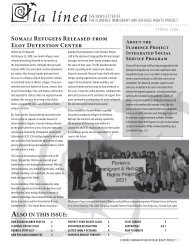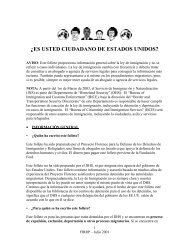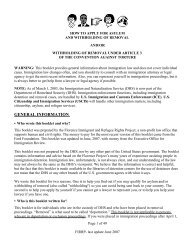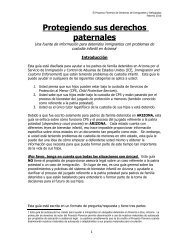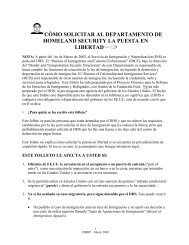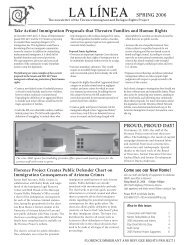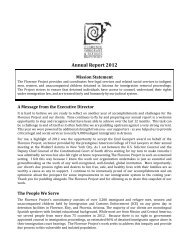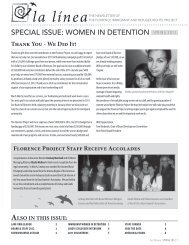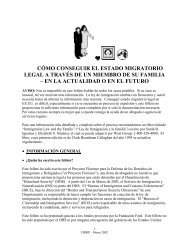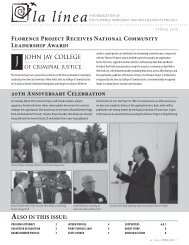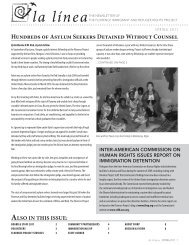quick reference chart and annotations for determining immigration ...
quick reference chart and annotations for determining immigration ...
quick reference chart and annotations for determining immigration ...
You also want an ePaper? Increase the reach of your titles
YUMPU automatically turns print PDFs into web optimized ePapers that Google loves.
Immigrant Legal Resource Center, Florence Immigrant <strong>and</strong> Refugee Rights Project,<br />
Maricopa County Public Defender August 2012<br />
F.3d 1057, 1061 n. 2 (9th Cir. 2006). Additionally, a single conviction under this statute might not trigger<br />
inadmissibility since the Dept. of State definition requires “elements of continuity <strong>and</strong> regularity,<br />
indicating a pattern of behavior or deliberate course of conduct…as distinguished from the commission of<br />
casual or isolated acts.” 22 C.F.R. § 40.24(b) (2006). Counsel should plead to acts other than sexual<br />
intercourse <strong>and</strong> avoid <strong>reference</strong>s to prior prostitution convictions.<br />
77. Possession, use, production, sale or transportation of marijuana, ARS §13-3405<br />
NOTE: On July 14, 2011, the Ninth Circuit prospectively overturned Lujan-Armendariz v.<br />
INS, 222 F.3d 728 (9th Cir. 2000), which had held that a single state drug possession conviction<br />
expunged pursuant to “rehabilitative relief” would not trigger removability as a controlled<br />
substance offense. See Nunez-Reyes v. Holder, 646 F.3d 684 (9th Cir. 2011) (en banc). There<strong>for</strong>e, a<br />
single conviction received on or after July 14, 2011 <strong>for</strong> simple possession, possession of<br />
paraphernalia, or another minor drug offense can no longer be eliminated <strong>for</strong> <strong>immigration</strong><br />
purposes by obtaining a set aside under ARS § 13-907.<br />
A single conviction <strong>for</strong> simple drug possession or possession of paraphernalia offense<br />
entered prior to July 14, 2011 may still be eliminated <strong>for</strong> <strong>immigration</strong> purposes under § 13-907 as<br />
long as the defendant did not violate probation. See Estrada v. Holder, 560 F.3d 1039 (9th Cir.<br />
2009). However, a conviction <strong>for</strong> use or under the influence of drugs will trigger removability as a<br />
controlled substance offense even if the conviction occurred prior to July 14, 2011. See Nunez-Reyes<br />
v. Holder, 646 F.3d at 695 (overruling Rice v. Holder, 597 F.3d 952 (9th Cir.2010)).<br />
Note also that a TASC disposition in certain Arizona counties where the prosecutor rather<br />
than the court imposes counseling requirements does not constitute a conviction <strong>for</strong> <strong>immigration</strong><br />
purposes. See discussion of these options at Note: Controlled Substances.<br />
A1. Possession or use<br />
a. Possession<br />
Crime Involving Moral Turpitude: No. The BIA reserved judgment on the question in Matter<br />
of Khourn, 21 I&N Dec. 1041 (BIA 1997), but it probably would not be so held. See also Hampton v.<br />
Wong Ging, 299 F. 289, 290 (9th Cir. 1924) (possession of opium is not a CMT).<br />
Aggravated felony: Where there is no prior drug conviction, a conviction <strong>for</strong> possession of<br />
marijuana is not an aggravated felony. Where there is a drug prior, the law is not established <strong>and</strong> counsel<br />
should be cautious. (Note that a plea to use, rather than possession, always will prevent an aggravated<br />
felony conviction; see below).<br />
The BIA has held that where a prior controlled substance conviction is pleaded or proved as part<br />
of an “enhancement” of a subsequent possession offense, it will convert the subsequent offense into an<br />
aggravated felony. If the prior conviction was not pleaded or proved <strong>for</strong> enhancement purposes, the<br />
subsequent possession offense is not an aggravated felony. See Carachuri-Rosendo v. Holder, 130 S. Ct.<br />
2577, 2586, 177 L. Ed. 2d 68 (2010); Matter of Carachuri-Rosendo, 24 I&N Dec. 382, 386 (BIA 2007).<br />
There<strong>for</strong>e, counsel should avoid pleading to a controlled substance offense in which a prior drug offense<br />
is an element, is alleged or is otherwise included as an “enhancement” in the charging document or<br />
judgment. Note that the current rule in the Ninth Circuit is better; the court held that a possession<br />
conviction is not an aggravated felony despite a drug prior. Oliveira-Ferreira v. Ashcroft, 382 F.3d 1045<br />
Arizona Criminal Chart with Explanatory Endnote – August 2012<br />
89




